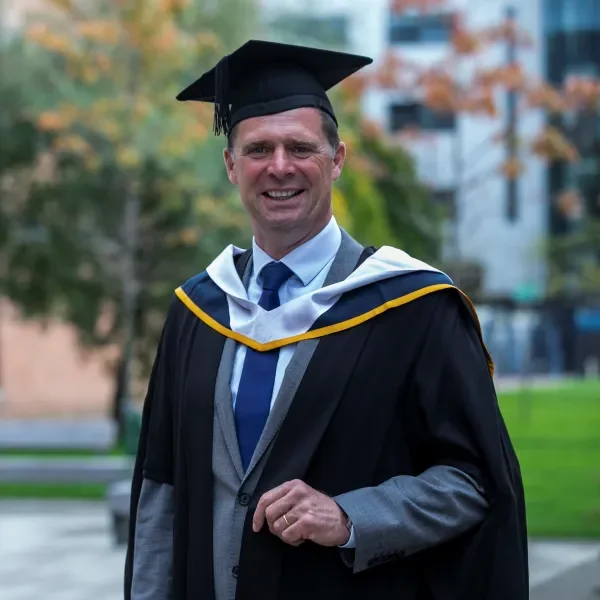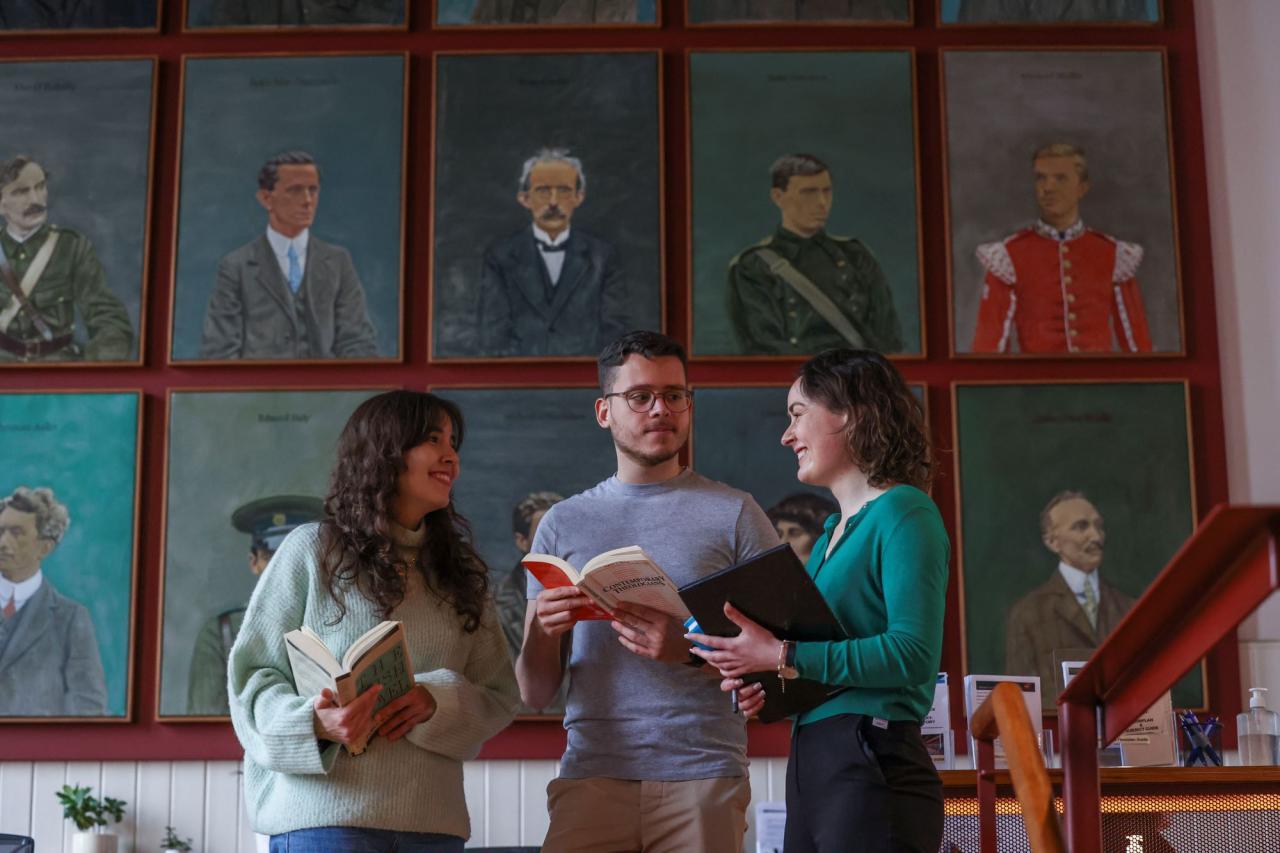Overview
This programme delves into how Irish sovereignty has evolved and the changing roles of religion, language, and gender.
The DCU School of History and Geography is unique in Ireland because it combines the fields of History and Geography. Our innovative teaching methods will give you valuable insights into Ireland's fascinating history and its global context, helping you better understand the world today and how it is shaping our future.
Why DCU
DCU People

My name is Marnie Hay and I am the Chair of the Master of Arts in History. For me, being a historian is a bit like being a detective.
Read more about Marnie Hay

“I played for my country and was commended for that but I now know far more about Ireland and that makes me happy,” said Niall Quinn as he graduated with a Masters in History.
Read more about Niall Quinn
Careers & Further Options
Careers
Enrolling in the MA in History programme offers you the opportunity to cultivate valuable skills that are highly sought after by employers.
These skills encompass independent thinking, the ability to organise, assess and convey intricate ideas and information, strong research and analytical capabilities, as well as proficiency in reflective writing, presentation and project management.
These aptitudes will make you a compelling candidate in the job market.
The MA in History is highly versatile and our graduates progress to a variety of careers in:
- Education
- University and arts administration
- Business
- Consultancy
- The civil service
- The heritage sector
- Journalism
- Media and publishing
Some graduates even choose to pursue further studies through doctoral research, expanding their expertise and opportunities in their chosen field.
"DCU graduates are highly sought after by employers. Our Graduates work in environments ranging from large multinationals to SMEs, family businesses and start-ups across every sector.
DCU Careers Service has a number of learning and development initiatives in place for our students, giving them the skills they need for a successful career path."
Entry Requirements
For admission to the MA in History, successful applicants will have:
• A degree at the level of an Irish or UK Honours undergraduate degree (H2.2 or above) or equivalent, in History or a cognate subject.
• Applicants with appropriate combinations of professional qualifications and experience may also be considered. This includes discipline-specific knowledge and know-how; transferable skills; basic research competency; personal effectiveness.
• Recognition of Prior Learning (RPL) applicants are required to submit a cover letter along with their application under the Transcripts section of the portal, affirming their intent to apply for RPL. For more information on RPL see here.
• International candidates who are non-native speakers of English must satisfy the University of their competency in the English language.
Programme Structure
Classes in this programme use a mix of seminars, workshops, small group discussions, and field trips to teach the material.
The focus is on promoting active and independent learning. Each module is worth 10 credits and is assessed through ongoing evaluations, which can include reviews, essays, research papers, learning journals, and class presentations.
Interpretation and Argument in History
This module introduces students to the tradition of history writing (historiography) as it has evolved and developed in Europe and the world since classical times, and in Ireland from the early seventeenth century to the present. Click here for more information.
Research Methods for the Historian
This module introduces a range of research methods and focuses on active engagement with the processes of gathering, evaluating and analysing historical evidence. Students are guided through the process of using archives and various online resources. A novel feature of this module not offered elsewhere is an introduction to Geographic Information System (GIS). A fundamental objective is to equip students to devise, and execute independent research projects. The module imparts important transferrable, research and writing skills. Click here for more information.
Ireland in the Twentieth Century: Crisis, Continuity and Change
Crisis, continuity and change are recurring themes in the history of twentieth-century Ireland. This module examines the central political, economic, social and cultural features of that historical experience using primary sources in a seminar setting. Click here for more information.
Promoting History
This module provides students with the opportunity to gain practical experience organising a history symposium at which they will present their research. Students also engage with the concept of public history by considering different ways in which history is promoted to a public audience, for instance, through documentaries, exhibitions and websites. Click here for more information.
The Irish Revolution in Context
This module interrogates the Irish revolution (1912-1923) by placing it in the context of, and comparing it with, other European revolutions that occurred during that era of imperial decline. By examining Irish and other European sources, students will not only deepen their knowledge of the Irish revolution but will consider what can be learned about the Irish experience through the study of other revolutionary or state formation moments, and debate what, if anything, made the Irish experience different? Click here for more information.
Gender and Society in Ireland since 1867
This module examines shifting gender roles in Ireland through the lens of individual women’s lives. Using a variety of primary sources, the module will chart the trajectory of continuity and change in the construction of gender roles. Click here for more information.
Dissertation
This year-long module allows students to produce their own piece of independent historical research, guided by a supervisor who will be an expert in the field. Click here for more information.
- Gain in-depth expertise and insight into the intricacies of modern Irish history and historical geography.
- Improve your critical thinking, analytical, and interpretative abilities.
- Develop the skills to plan, research, and create a substantial original research project.
- Cultivate transferable skills like independent thinking, analysis, effective communication, organisation, and time management.
DCU holds an impressive global ranking in the top 250 universities for Arts and Humanities, according to Times Higher Education, a respected ranking organisation. The School of History and Geography at DCU stands out in Ireland for its diverse interdisciplinary offerings. It has earned recognition, both nationally and internationally, for its influential research in the fields of Ireland's History and Geography.
The MA in History programme is led by expert faculty members who have extensive publications in prominent books and journals and have shared their knowledge through various media outlets.
Furthermore, DCU's location in Dublin is advantageous due to the wealth of libraries and research institutions available in the city, including the National Library of Ireland and the National Archives of Ireland.
Fees and Funding
Fees
How To Apply
To apply for this programme:
All Applicants must apply through DCU's Student Application Portal which is available here. Here's a quick step by step guide if you need help with your application:
- Provide Academic Transcripts for each and every year of study with English translation, if applicable.
- If applicable, provide evidence of competence in the English language as per DCU entry requirements. Please see link http://www.dcu.ie/registry/english.shtml
Application Deadlines
Applications will be accepted on a rolling basis until the programme is full or until the following dates:
- Closing date for non EU applicants is 1st July 2025
- Closing date for EU applicants is 30th August 2025
Please note if you are a non EU student and require a study visa, you are not eligible to apply for part-time programmes as study visas are only granted for full-time programmes.
Note applicants who require a study visa for the purposes of studying at DCU, are advised to apply as early as possible.
All entry requirements should be met before the commencement of the programme.
Application Queries
For EU applicant queries, please visit https://www.dcu.ie/registry/eu-postgraduate-taught-admissions or email postgraduateadmissions@dcu.ie
For non EU applicant queries, please visit https://www.dcu.ie/registry/international-admissions-undergraduate-and-postgraduate or email internationaladmissions@dcu.ie
Commencement of Programme
The programme commences in September 2025
Life On Campus
At DCU, our students can expect a unique campus experience. We are known for our excellent teaching and learning facilities, our active clubs and societies, and our great social and sporting facilities. All this makes DCU an exciting place to be.
DCU has three academic campuses; Glasnevin, St. Patrick’s and All Hallows (both in Drumcondra), all close to Dublin City centre.
They can be reached by public transport, Dublin Bus and Bus Éireann, with our Drumcondra campuses a ten minute walk from Drumcondra Train Station. Glasnevin is a 20 minute walk from St Patrick’s and All Hallows. They are also linked by Dublin Bus.
Each campus has a library (O’Reilly, Cregan and Woodlock Hall), study spaces, restaurants, and on-campus residencies. There are sports facilities on Glasnevin and St. Patrick’s, and there is a dedicated sports campus, St Claire’s, located near Glasnevin on the Ballymun Road.
DCU’s 19,000 students have access to exceptional teaching and learning facilities across our three academic campuses.
These include modern learning theatres, research centres, a new media and TV studio, radio/podcast studios, computer suites and advanced labs in the areas of Languages, Engineering, Physics, Chemistry and Biotechnology, as well as a Sports Performance centre and a training hospital ward. In 2021, we opened our first virtual reality ‘Leadership Lab’, which is located in our Business School.
We continue to improve and update our facilities. For example, construction of a new world-class STEM facility is underway on the Glasnevin campus. With capacity for an extra 3,000 STEM students, this facility will advance DCU’s international reputation for excellence in science and health, computing and engineering disciplines.
Studying in DCU isn’t just about course work. The university is rich in student life and activities.
There are more than 140 clubs and societies for students in DCU, with ‘Clubs & Socs’ days taking place on both the Glasnevin and Drumcondra campuses at the start of the academic year. They span everything from rugby to rock climbing, anime to jazz.
For many students, sport is an important part of the DCU experience. DCU’s Sports Complex boasts a 25 metre swimming pool, fitness centre gym, all-weather pitches and squash courts, as well as soccer, GAA and rugby pitches. DCU Dóchas Éireann, the university’s GAA club, is the largest third level Gaelic Games club in the country. Meanwhile, DCU Athletics has been Ireland’s highest achieving university club for many years. And DCU has dozens of other clubs to get involved in, from Archery to Weightlifting.
The Glasnevin campus is home to our purpose built, state-of-the-art student centre, The U, which serves the needs of a rapidly growing student body. Here, you will find the Student Leadership and Lifeskills Centre, performing arts and cultural spaces for students and the wider community, and the Entrepreneurship and Innovation Hub. Also located on our Glasnevin campus is The Helix, our renowned performing arts centre.
On our St Patrick’s campus, we have the Java Student Hub, a vibrant, warm and welcoming space where students can meet for coffee, play music, use the projector to watch events, or just relax. The walls of the Java Hub were designed based on the cultural history of St Patrick’s Campus, including the special references to the notable sporting history and history of the arts.
We have a number of academic, professional and social supports for students.
Student Advice & Learning Skills Centre - Offers a wide range of supports and services to students and advice
The Writing Centre - drop-in writing workshops for students through the academic year
Maths Learning Centre - provides maths support for students of all ability levels with maths modules
Student Learning - facilitate the transition from passive to active learning for students at DCU, by teaching study skills, nurturing critical thinking and building student confidence.
Careers work with students to help them on their professional journey into graduate employment.
Our student support team offers a comprehensive support programme, helping students make that all important transition into university life and focusing on building confidence and skills which are key to success at third level.

DCU Glasnevin Campus
FAQs
Is DCU all one campus?
DCU is a multi campus university - the Glasnevin, St Patrick's and All Hallows campuses. The St Patrick's campus is where the Education courses are taught and some of the subjects from the BA Joint Honours degree. There is a 20-25 minute walk between the campuses but there are buses and bikes available to go between them also.
Click here to see maps of all of our campuses
If I'm studying on the St Patrick's campus, can I use the library and sports centre on the Glasnevin campus?
Yes, all facilities such as sports and accommodation are open for all DCU students to avail of.
Are there libraries in DCU and if they have wifi and work stations?
We have a brand new state of the art four floor library on our St. Patrick's Campus which complements the existing library on the Glasnevin campus. There is free wifi, work stations as well as desktop computers.
Does DCU provide accommodation?
DCU does have on-campus accommodation for undergraduate and postgraduate students, and you can find out more and apply via the Accommodation Office webpage.








